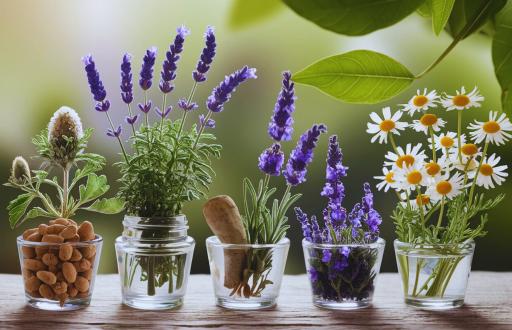In a world that often feels like a whirlwind of chaos, anxiety can creep in, leaving many searching for solace. While conventional medicine has its place, an increasing number of individuals are turning to alternative medicine, seeking the gentle embrace of nature’s remedies. Herbal solutions have been used for centuries, offering a holistic approach to mental well-being. Here, we delve into five potent herbal remedies that may help calm anxiety, each with its unique properties and benefits.
1. Chamomile: The Gentle Soother
Chamomile, often enjoyed as a warm cup of tea, is renowned for its calming effects. This delicate flower, with its daisy-like appearance, has been used since ancient times to promote relaxation and sleep. The active compounds, particularly apigenin, bind to specific receptors in the brain, reducing anxiety and inducing a sense of tranquility. Imagine sipping a steaming cup of chamomile tea as the sun sets, the aroma wrapping around you like a comforting blanket.
How to Use:
- Tea: Brew chamomile tea and enjoy it before bedtime. The ritual of preparing and sipping the tea can itself be a calming experience.
- Essential Oil: Consider chamomile essential oil for aromatherapy. A few drops in a diffuser can create a serene atmosphere in your home.
Additional Benefits:
Chamomile is not only effective for anxiety but also aids digestion and can help alleviate menstrual pain. Its anti-inflammatory properties make it a versatile addition to your herbal arsenal.
2. Lavender: Nature’s Aromatic Antidote
Lavender, with its vibrant purple blooms and soothing scent, is more than just a pretty flower. This herb has been celebrated for its ability to alleviate stress and anxiety. Research suggests that inhaling lavender essential oil can significantly reduce anxiety levels, promoting a sense of calm. The floral fragrance can transport you to a serene lavender field, where worries dissipate like morning mist.

Top On Sale Product Recommendations!
100g Turmeric Hand Made Soap Lemon Kojic Acid Soap Shower And Facial Soap Powerful Moisturizing And Cleansing Of The Skin
Price Now: USD 0.99
(Original price: USD 3.82, 74% off)

How to Use:
- Diffuser: Use lavender essential oil in a diffuser to fill your space with its calming aroma.
- Bath: Add a few drops to your bath for a relaxing soak. The warm water combined with lavender can create a spa-like experience at home.
Additional Benefits:
Lavender is also known for its sleep-inducing properties. It can help improve sleep quality, making it a perfect companion for those restless nights. Furthermore, lavender has antiseptic and anti-inflammatory properties, making it useful for minor burns and insect bites.
3. Passionflower: The Calming Climber
Passionflower, a climbing vine with striking flowers, is another herbal ally in the battle against anxiety. Traditionally used by Native Americans, this herb is believed to increase levels of gamma-aminobutyric acid (GABA) in the brain, a neurotransmitter that helps regulate mood. The result? A soothing effect that can help ease racing thoughts and promote restful sleep.
How to Use:
- Capsules or Tincture: Take passionflower in capsule form or as a tincture for a concentrated dose.
- Tea: Brew it as a tea for a calming evening ritual. The process of making tea can itself be a meditative practice.
Additional Benefits:
Passionflower is also known to help with insomnia and can be beneficial for those experiencing withdrawal symptoms from certain medications. Its calming effects can enhance overall emotional well-being, making it a valuable addition to your herbal toolkit.
4. Valerian Root: The Sleep Inducer
Valerian root, often referred to as nature’s sleeping pill, has been used for centuries to combat insomnia and anxiety. Its earthy aroma may not be for everyone, but its effects are undeniable. Valerian root works by increasing GABA levels in the brain, similar to passionflower, helping to calm the nervous system. Picture yourself drifting off to sleep, cradled by the gentle embrace of this powerful herb.
How to Use:
- Tea: Take valerian root in tea form about an hour before bedtime to promote relaxation.
- Capsules: Use valerian extract for a more concentrated effect, especially if you struggle with sleep disturbances.
Additional Benefits:
Valerian root is not only effective for anxiety but also helps improve sleep quality and reduce the time it takes to fall asleep. It may also alleviate symptoms of menopause, such as mood swings and sleep disturbances.
5. Ashwagandha: The Adaptogenic Powerhouse
Ashwagandha, a staple in Ayurvedic medicine, is an adaptogen that helps the body adapt to stress. This remarkable herb not only reduces anxiety but also enhances overall well-being. With its roots deeply embedded in ancient healing practices, ashwagandha is celebrated for its ability to balance cortisol levels, the hormone responsible for stress. Imagine feeling grounded and resilient, no matter what life throws your way.
How to Use:
- Powder: Take ashwagandha in powder form mixed with smoothies or warm milk for a nourishing drink.
- ** Capsules:** Opt for capsules for a convenient daily dose, ensuring consistent intake for optimal benefits.

Additional Benefits:
Ashwagandha is known to improve energy levels, enhance cognitive function, and support immune health. Its adaptogenic properties make it a versatile herb for those facing chronic stress or fatigue.
Conclusion
Incorporating herbal remedies into your routine can be a gentle yet effective way to manage anxiety. While these natural solutions offer promise, it’s essential to consult with a healthcare professional before starting any new treatment, especially if you are already on medication. The journey to tranquility is personal, and what works for one may not work for another. Embrace the power of nature, and explore these herbal allies as you seek a calmer, more balanced life. Remember, the path to mental well-being is not a one-size-fits-all approach; it requires patience, experimentation, and self-discovery.
FAQ
Q1: Are herbal remedies safe to use with prescription medications?
A1: While many herbal remedies are safe, some can interact with prescription medications. Always consult your healthcare provider before combining herbal treatments with conventional medicine.
Q2: How long does it take for herbal remedies to work?
A2: The time it takes for herbal remedies to show effects can vary. Some may provide immediate relief, while others may require consistent use over several weeks.
Q3: Can I use these herbs if I’m pregnant or breastfeeding?
A3: Many herbs are not recommended during pregnancy or breastfeeding. Always consult with a healthcare professional before using any herbal remedies in these situations.
Q4: Where can I find these herbal remedies?
A4: Herbal remedies can be found in health food stores, online retailers, and some pharmacies. Look for high-quality products from reputable brands.
Q5: Are there any side effects associated with these herbs?
A5: While many herbal remedies are generally safe, some individuals may experience side effects such as digestive upset or allergic reactions. It’s important to start with small doses and monitor your body’s response. If you experience any adverse effects, discontinue use and consult a healthcare professional.






